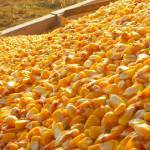Grinding or Cracking Corn: Does It Affect Digestibility by Horses?

This study was conducted to evaluate how cracking, grinding, or steam processing affects starch digestibility of corn, using glycemic response as an indirect measure of prececal starch digestibility.
The glycemic response of each grain was compared using a glycemic index where each feed’s glucose area under the curve was expressed relative to cracked corn. Steam-flaked corn produced a greater glycemic response than cracked or ground corn. Peak glucose was also greater for steam- flaked corn. Horses on the cracked corn diet demonstrated greater peak glucose than those on ground corn. Plasma glucose concentrations were consistently lower for cracked and ground corn treatments, when compared with steam-flaked corn from 90 to 180 minutes post feeding during sample collection. Time to peak glucose was unaffected by processing. Mean lactate, peak lactate, and time to peak lactate were unaffected by processing.
Steam flaking alters glycemic response to a much greater extent than grinding or cracking. Higher peak concentrations of glucose in the plasma of horses fed steam-flaked corn indicated that steam-flaking results primarily in small intestinal digestion, avoiding excessive microbial fermentation in the large intestine and greater lactate production by the hindgut. Further research is necessary to determine if other processing techniques that involve heating the corn kernel, such as extruding or micronizing, will result in similar improvements in glycemic response.
This report of KER’s research was published in Proceedings of the 16th Equine Nutrition and Physiology Society Symposium.
Read the entire research paper, titled Effect of Corn Processing on Glycemic Response in Horses.








